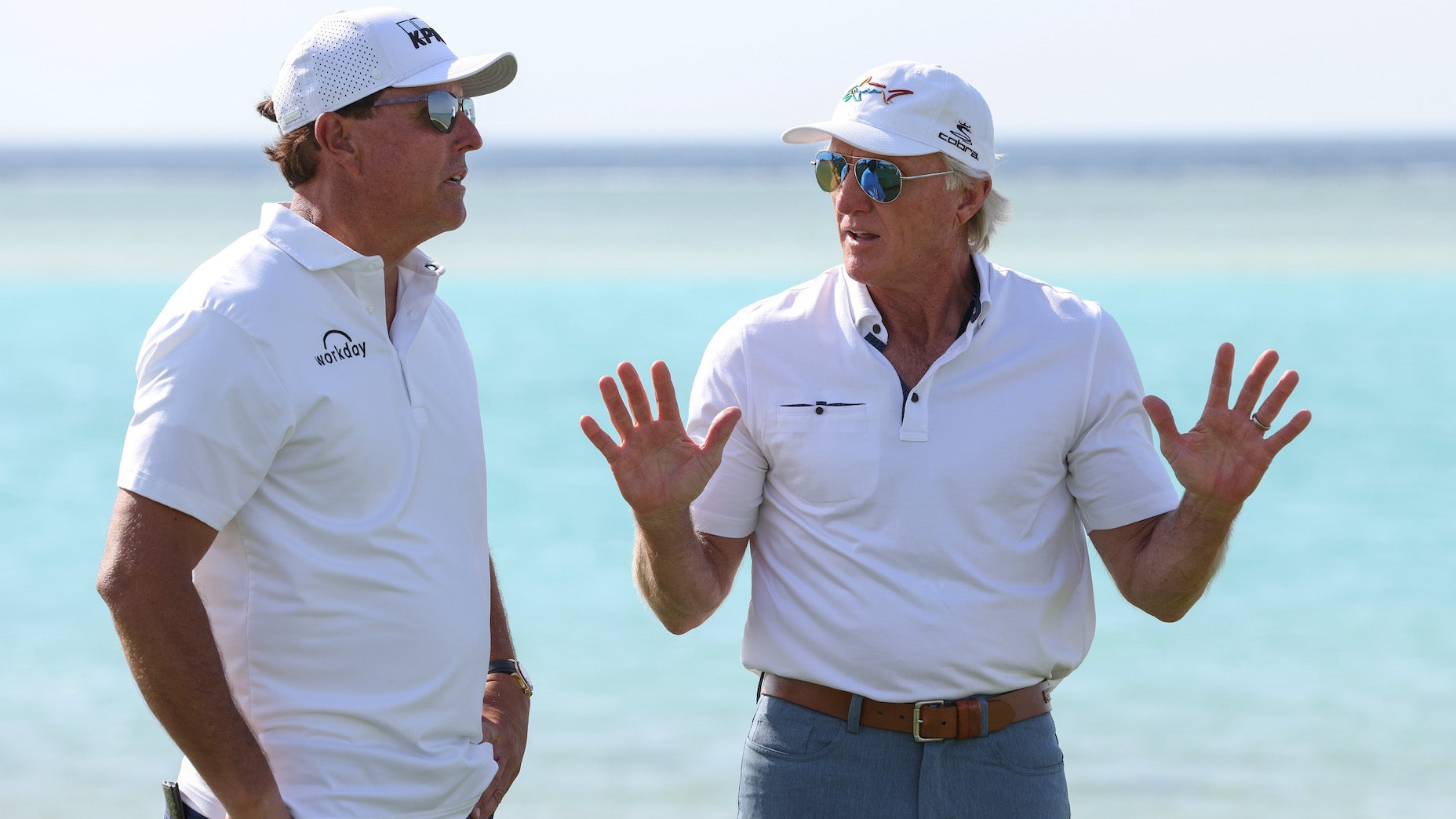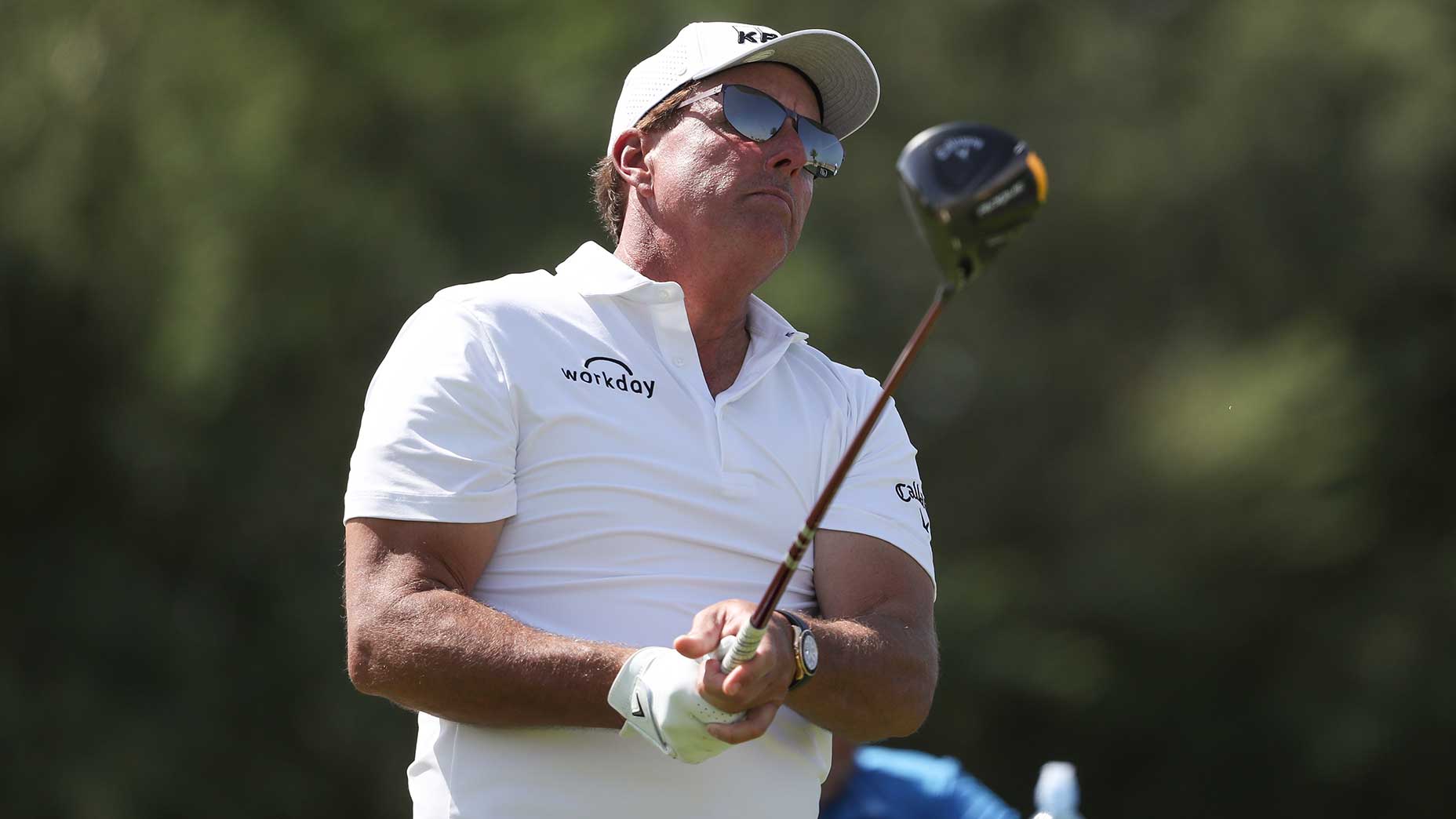Jon Rahm rode eight birdies to the top of the leaderboard at 8 under at LIV United Kingdom on Friday, surging to the front of the pack after Bubba Watson tumbled through consecutive par-4s in 12 shots.
‘Phil’s making stuff up’: PGA Tour responds to Mickelson’s ‘obnoxious greed’ comments

Mickelson’s “obnoxious greed” remarks did not go unnoticed by PGA Tour executives, who say the accusations are inaccurate.
The post ‘Phil’s making stuff up’: PGA Tour responds to Mickelson’s ‘obnoxious greed’ comments appeared first on Golf.
Mickelson’s “obnoxious greed” remarks did not go unnoticed by PGA Tour executives, who say the accusations are inaccurate.
The post ‘Phil’s making stuff up’: PGA Tour responds to Mickelson’s ‘obnoxious greed’ comments appeared first on Golf.
Like everyone else in the golf world, the PGA Tour heard every word of Phil Mickelson’s “obnoxious greed” diatribe at last week’s PIF Saudi International.
Mickelson’s pointed attacks were hard to miss given he described the Tour, in an interview with Golf Digest, as the gatekeepers of “roughly $20 billion” in media assets and “hundreds of millions of digital moments” that rightfully belong to the players. Mickelson may have intended to fire a warning shot but his comments landed like a mortar shell at Tour headquarters; he essentially accused Ponte Vedra executives of taking players’ hard-earned money and diluting it, if it ever reached their pockets at all.
“I don’t know where things are headed, but I know I will be criticized,” Mickelson told Golf Digest. “The media rights are but a small fraction of everything else. And it is the Tour’s obnoxious greed that has really opened the door for opportunities elsewhere.”
Mickelson’s remarks were fodder for a week’s worth of chatter about Tour policies, player rights and Mickelson’s rumored interest in the Saudi-backed, Greg Norman-led Super League. They marked his most direct criticism of the Tour yet, lobbed conveniently from the would-be rival tour’s home turf.
One other talking point has also surfaced: the accuracy, or lack thereof, of Mickelson’s gripes.
In conversations with GOLF.com, PGA Tour executives painted a far different picture of the economics of golf’s largest professional tour, characterizing it as a highly successful, multi-billion-dollar business model built around its media-rights deals — and with constituents who’ve largely been content with that structure. (It should also be noted that the Tour operates as a federally registered non-profit, which means though it donates large sums to charity it also is sheltered from paying hundreds of millions of dollars in taxes.)
“I’ve never seen anybody be really interested in how we generate the money,” one Tour executive, speaking on the condition of anonymity, told GOLF.com. “There’s some conversation about it now because, you know, Phil’s making stuff up that’s just not true. But in general, they’re happy that there’s a lot of money that comes from it.”
There undoubtedly is a lot of money in the Tour’s coffers that goes directly to players: more than $800 million per year, according to a memo shared by the Tour. That figure, according to the same records, represents 55 percent of the Tour’s more than $1.5 billion in revenues — a percentage that is on par with other professional sports leagues, and much more than the figure Mickelson referenced on Gary Williams’ “5 Clubs” podcast in September.
“It’s a difficult situation on the PGA Tour relative to other sports, because in football, baseball, basketball, they have roughly 55 percent of their revenues going to the players,” Mickelson told Williams. “They have great representation, and when they have aggrievements, they go to a certain person. On the PGA Tour, we have 26 percent of the revenue going to the players, and when we have aggrievements, we go to the commissioner, who says, ‘Ah, I don’t really want to pay you anymore, I’m good.’”
While there’s room to quibble with the Tour’s calculations — more than $100 million in player earnings are credited to endorsement deals through the Tour’s official marketing partners, in which the Tour’s direct involvement is hard to ascertain — it’s unclear from where Mickelson derived his 26 percent figure.
One area of particular interest for Mickelson and other Tour critics is media rights, which generate upward of $600 million per year globally for the Tour, according to records reviewed by GOLF.com. (The actual revenue generated by Tour media deals is closer to $1 billion, but that includes close to $400 million in concessions for sponsors and production costs, which are fairly commonplace in rights deals.)

Phil Mickleson speaks with LIV Golf Investments CEO Greg Norman at the Saudi International.
Getty Images
The Tour says a significant chunk of its overall media value is derived from the unusual structure of its contracts, which bake-in pre-sold advertising. As part of its agreements with tournament title sponsors, the Tour mandates sponsors to purchase a specific amount of television advertising during tournament week. This raises the Tour’s asking price in negotiations and lowers risk for the Tour’s broadcast partners — who need to sell less advertising to break even on a Tour event than with other professional sports broadcasts. This structure leverages every cog of the Tour’s corporate apparatus, which operates using some of the remaining 45 percent of Tour revenues.
Tour critics have also honed in on exclusivity. Tour players are independent contractors and not employees of the organization, as is the case in most other sports leagues. As such, they are required to sign a waiver each year granting their exclusive, individual rights to the Tour and its media partners. As Mickelson rightfully pointed out at the Saudi International, the Tour charges a fee for those who wish to stage a golf telecast outside of the Tour’s media partners, as was the case with The Match. But, the Tour confirmed, Turner Sports paid the $1 million rights fee, not Mickelson himself, as he alleged. It’s even possible Mickelson profited from that rights fee, a Tour source said, because more than half of such fees are added to the revenue pool that the Tour redistributes to players. The same would be true for the Tour’s new Netflix series or any other media-rights deal.
Exclusivity is a matter of logic as much as it is one of money, says Ed Desser, a California-based sports media consultant and rights expert. For a network to sign a multi-billion-dollar rights deal spanning close to a decade, it’s important for the network to receive assurances it will be the only show in town, in turn maximizing the potential profitability of its broadcasts.
“It is a common thing,” Desser said. “The general term is the ‘grant of rights,’ and there’s a grant of rights in practically every sports agreement. There are a couple of flavors of grants of rights, there are sort of the explicit, we’re giving you the right to do x on this particular platform. And then there are defensive terms. We agree not to license x or y so that you have a reasonable expectation of exclusivity.“
Tour officials noted that exclusivity is not specific to the PGA Tour. (“There’s a reason you don’t see Tom Brady and Aaron Rodgers playing in a flag football game on television,” a Tour employee pointed out.)
All of this leads, naturally, to the $20 billion question: Is there any way the Tour’s media assets are worth as much as Mickelson estimated?
“I wish they were,” a Tour executive said with a laugh. “No, they aren’t. That’s just not accurate.”
Tour sources weren’t even sure where Mickelson came up with the $20 billion number, or which “assets” he meant. If he was referring to the Tour’s media archives, one source said, it’s true that some money is generated from licensing, but “that number certainly doesn’t start with a ‘B’.”
Mickelson might not like it, but these are the terms of doing business with the Tour, as they have been for the quarter-century over which he has pocketed $94.5 million in Tour earnings. But, hey, if he has any ideas on turning media rights into a $20 billion business, the Tour is all ears.
“Whatever gets generated goes to the players, the same way all other media rights do,” the executive said. “If we could make $20 billion on it, we would, believe me. But no one’s figured out how to do that exactly just yet.”
The post ‘Phil’s making stuff up’: PGA Tour responds to Mickelson’s ‘obnoxious greed’ comments appeared first on Golf.

